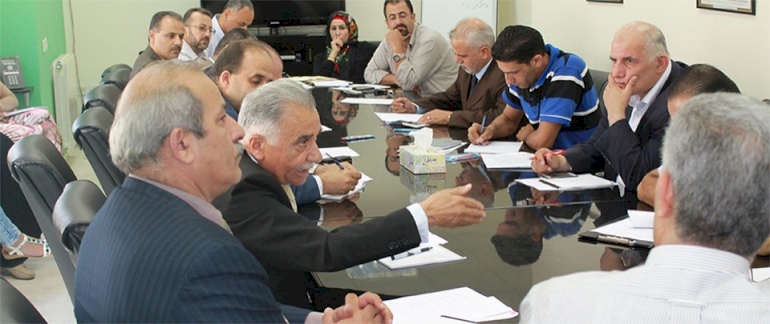
In light of the increase in food and drugs related corruption crimes and the significant risk they pose to the Palestinian community, combined with pressure from Palestinian public opinion to curtail these crimes and severely punish the perpetrators, AMAN held a discussion involving all the relevant authorities in this field. Participants included: the High Judicial Council (HJC), the office of the public prosecution, consumer protection associations, the Ministry of Economy, the Ministry of Health, the Justice Ministry, the police department, the Palestine Standards Institute (PSI), the Council of Ministers, the Palestinian Food Industries Union (PFIU), and the Palestinian Businessmen’s Association. The panel also included experts, academics and retired jurists in this field.
Food and drugs related crimes of corruption have been discussed on several occasions in the past by AMAN in participation with many of the relevant authorities and various recommendations were concluded. It was apparent that some of the obstacles hindering the effective prosecution of such crimes were due to the power struggle between the relevant official authorities (Ministry of Health, Ministry of National Economy, the public prosecutor, district authorities, and the police). In addition, the authorities have evaded their responsibilities in this regard; their claims that each official body is fulfilling its role as required did not provide any explanation as to the reason for the continued prevalence of this phenomenon.
Several related issues were raised by workshop participants. Former Chief Justice Mr. Issa Abu Sharar indicated that the absence of a clear legal reference and a competent food and drugs administration, such as those that exist in comparative cases, was the most significant problem.
Mrs. Najat Briki, head of the economic crimes department, confirmed that the main issue was the lack of awareness prevailing within the competent institutions regarding crimes related to food and drugs corruption. She stressed the need to train inspection personnel on how to prepare a solid and indisputable legal case. She added that consumer issues were considered as minor and were not given a high priority, thereby slowing down the prosecution process.
Mr. Ibrahim Al Qadi, director of the consumer protection department within the Ministry of National Economy, stressed that a major problem in this area was the reluctance of the Palestinian judiciary to impose deterrent penalties on perpetrators of crimes of corruption related to food and drugs, in addition to some procedural issues in Palestinian courts regarding testimony and the technical reports required.
Judge Imad Maswadah, an appeal judge and a representative on the HJC, stated that judges are bound by legal texts and general legal principles, particularly the principles of innocence until proven guilty and “beyond a shadow of a doubt”. However, he stressed that the Judicial Council would not tolerate crimes of corruption related to food and drugs and would discuss the adoption of policies and regulations.
Mr. Masrouji, a representative of the private sector in the workshop, stated that such crimes should be punished severely and the names of businesses involved in proven criminal activity of this nature should be made public.
Mr. Alaa Abu Al Rub, director of the nutrition department in the Ministry of Health, noted that the issue should be addressed via the Public Health Law and the PSI code ..
Mr. Mohammed Shaheen, a representative of the Consumer Protection Association, emphasized the need to amend and improve existing legislation to a level that would ensure consumer protection, in addition to the establishment of a specialized court to hear cases of economic crimes.
Mr. Omar Rahaal, director of the Shams Organization, called for a committee or group to be formed to follow up the recommendations of the workshop. He also emphasized the need to improve consumer awareness of their rights.
Mr. Azmi Shyoukhi, head of the Consumer Protection Association, stated that consumer protection associations needed to be empowered to fulfill their assigned responsibilities. He also advocated that financial claims for compensation by consumers be permitted to be heard before the courts.
Mr. Nabil Sadi, head of the economic crimes department within the Palestinian police, emphasized the need to integrate the roles of various departments and stakeholders to improve performance.
At the conclusion of the workshop, participants made a number of recommendations. The most significant of these are as follows:
1. The need to form a national committee or group assigned to develop a comprehensive public plan to combat food and drugs related corruption crimes. The committee should be approved by the Council of Ministers. It would monitor the roles of various agencies and review the legislative framework and policy to combat this phenomenon. Working under the jurisdiction of the Council of Ministers, it would present the Council with periodic reports. This committee would encompass all relevant official bodies, chaired by the Minister of Health, and would include representatives from the civil sector (consumer protection associations and AMAN) as well as the private sector.
2. The need to enact legislation granting administrative bodies the jurisdiction to take the preventive measures required to safeguard Palestinian consumers and Palestinian public health. The Ministry of Health and the Ministry of National Economy may withdraw the licenses of business owners accused of food and drugs related corruption crimes, while maintaining a right of appeal before the competent courts.
3. The need for the Judicial Institute to train judges and prosecutors on economic crimes, in addition to training for inspection teams within the different ministries to enhance their legal expertise.
4. Encourage consumer protection associations and their role in raising awareness and monitoring all the relevant parties.
5. Bring the Consumer Protection Board into operation..
(5).jpg) This project funded by the EU
This project funded by the EU
